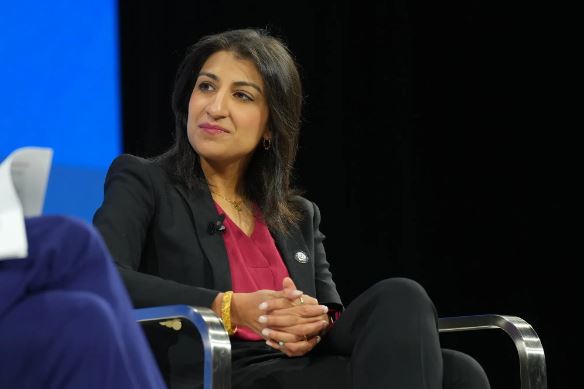The Federal Trade Commission (FTC) has taken an unprecedented step by filing a lawsuit to thwart Tapestry’s proposed $8.5 billion acquisition of Capri, a move that would merge major fashion brands including Coach, Kate Spade, Michael Kors, and Versace.
Led by Chair Lina Khan, the FTC has been increasingly vigilant in challenging large-scale corporate mergers across various industries. This lawsuit marks another instance of the agency’s efforts to address concerns regarding monopolistic practices and anti-competitive behavior in the business world.
According to Henry Liu, Director of the FTC’s Bureau of Competition, the agency’s primary concern revolves around the impact on “accessible luxury” accessories, a market segment encompassing more affordable products from brands like Coach, Kate Spade, and Michael Kors. The merger, if allowed, could potentially reduce competition and lead to higher prices for consumers.
Tapestry’s CEO, Joanne Crevoiserat, defended the acquisition, emphasizing the continued availability of diverse choices for consumers in the handbag market. She argued that the deal would not significantly alter the competitive landscape, citing the abundance of options available from various retailers and online platforms.
Both Tapestry and Capri expressed their intention to contest the FTC’s legal challenge, asserting that the merger would not hinder competition and that consumers would still have ample opportunities to purchase handbags from a wide array of brands and retailers.
The proposed acquisition, announced last August, aimed to establish an American luxury conglomerate capable of rivaling European giants like LVMH and Kering. While the combined revenue of Capri and Tapestry would reach approximately $12 billion, it would pale in comparison to the substantial figures reported by LVMH, which recorded revenue exceeding $92 billion in 2023.
Despite regulatory approvals from the European Union and Japan, the FTC’s scrutiny of the deal has persisted. Market observers have noted a decline in Capri’s stock value this year, signaling growing skepticism about the acquisition’s completion. Meanwhile, Tapestry’s shares have experienced a modest increase, reflecting investor uncertainty surrounding the deal’s outcome.
The FTC’s opposition to the merger is grounded in concerns over Tapestry’s potential for further acquisitions and market consolidation. Documents obtained by the agency suggest that Tapestry views the Capri deal as a strategic move to bolster its position in the fashion industry and pave the way for future transactions.
For Tapestry, this acquisition represents a pivotal opportunity to expand its portfolio and solidify its presence in the luxury market. Despite the regulatory hurdles, CEO Joanne Crevoiserat remains resolute in pursuing the deal, underscoring its strategic significance for the company’s growth trajectory.
As the legal battle unfolds, the outcome of the FTC’s lawsuit will have significant implications for the future of Tapestry, Capri, and the broader fashion industry. Whether the merger proceeds as planned or faces regulatory opposition, the case underscores the increasing scrutiny faced by large corporations seeking to consolidate market power through acquisitions.

